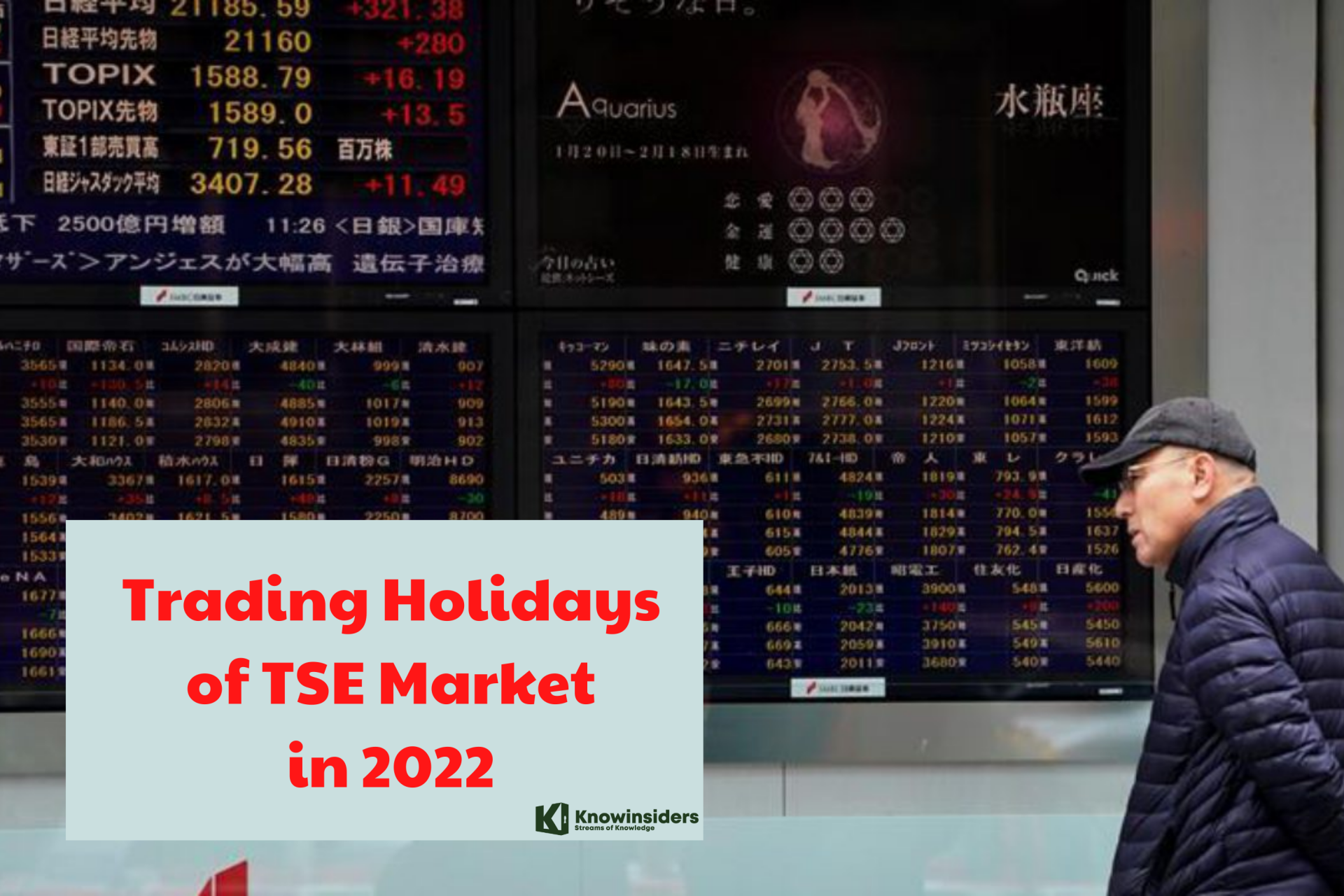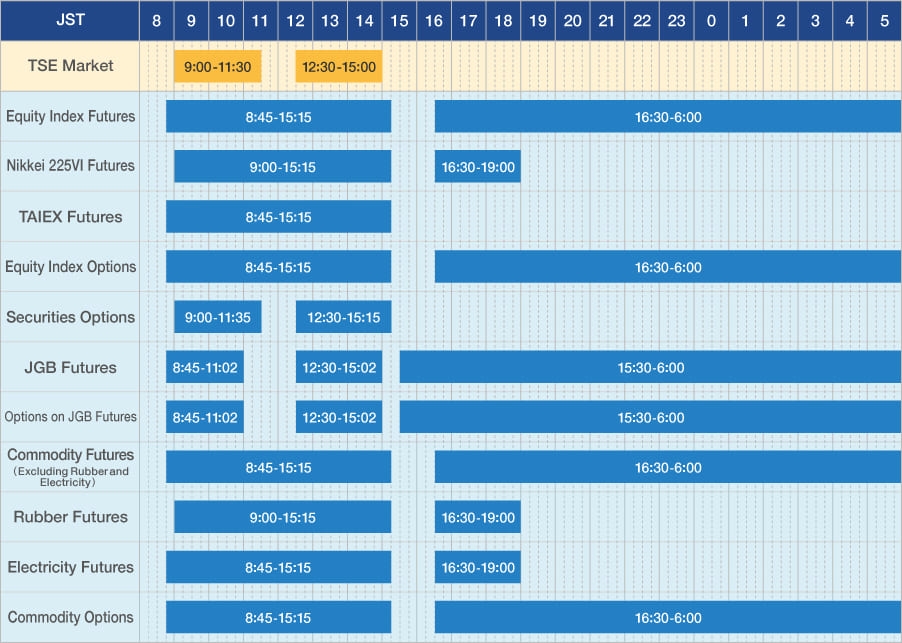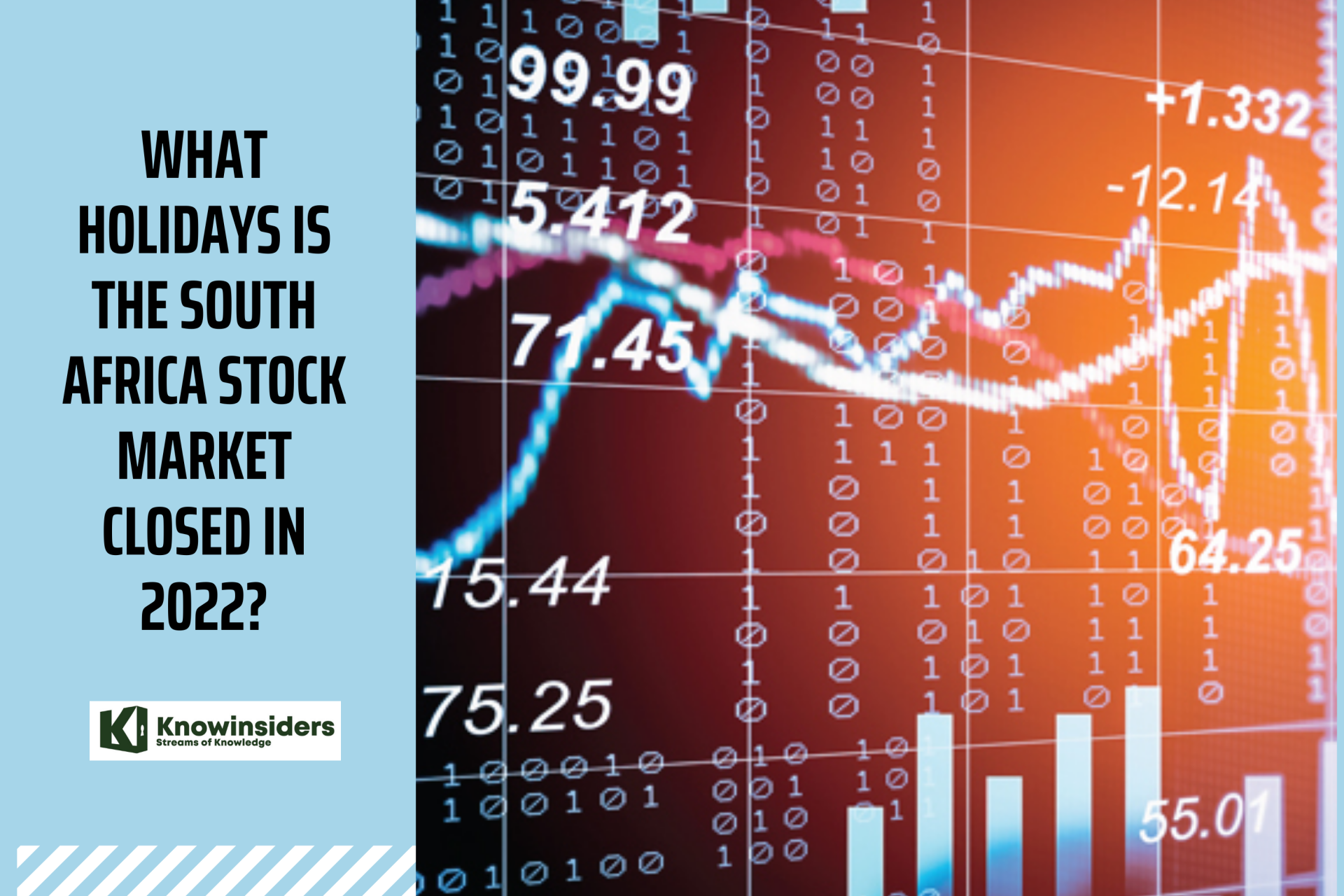What Holidays Are Japan Stock Market Closed?
 |
| Photo: KnowInsiders |
What Is the Tokyo Stock Exchange (TSE)?
The Tokyo Stock Exchange (TSE) is the largest stock exchange in Japan, headquartered in its capital city of Tokyo. The Tokyo Stock Exchange was established on May 15, 1878. As of Sept. 14, 2021, the exchange had 3,784 listed companies.1 The TSE is run by the Japan Exchange Group and is home to the largest and best-known Japanese giants with a global presence—including Toyota, Honda, and Mitsubishi.
In addition, the TSE offers specific trading information, real-time and historical index quotes, market statistics, and information about and from specialists. Notably, the acronym TSE for the Tokyo Stock Exchange should not be confused with Canada's Toronto Stock Exchange, which is known by the acronym TSX.
Other Major International Exchanges
In addition to the Tokyo Stock Exchange, other major trading exchanges worldwide include the New York Stock Exchange (NYSE), the Nasdaq, and the London Stock Exchange (LSE). Each exchange has specific listing requirements that owners must meet prior to offering their securities for trading.
In general, these requirements include regular financial reports, such as audited earning reports, and minimum capital requirements. For example, the NYSE has a key listing requirement that stipulates a company must have at least 1.1 million publicly traded shares of stock with a stock price of at least $4 per share. The company must have an aggregate pre-tax income of $10 million for the previous three fiscal years, with at least $2 million in each of the most recent two fiscal years.5 Nasdaq requires listers to meet aggregate pre-tax income in the prior three fiscal years of at least $11 million and a minimum bid price of $4.
| Holiday | Date | Status |
|---|---|---|
| New Year's Day | Saturday, January 1, 2022 | Closed 1 month from now |
| Market Holiday | Sunday, January 2, 2022 | Closed 1 month from now |
| Market Holiday | Monday, January 3, 2022 | Closed 1 month from now |
| Old Age Day | Monday, January 10, 2022 | Closed 1 month from now |
| National Day | Friday, February 11, 2022 | Closed 2 months from now |
| Emperor's Birthday | Wednesday, February 23, 2022 | Closed 2 months from now |
| Vernal Equinox | Monday, March 21, 2022 | Closed 3 months from now |
| Showa Day | Friday, April 29, 2022 | Closed 5 months from now |
| Constitution Day | Tuesday, May 3, 2022 | Closed 5 months from now |
| Greenery Day | Wednesday, May 4, 2022 | Closed 5 months from now |
| Children's Day | Thursday, May 5, 2022 | Closed 5 months from now |
| Marine Day | Monday, July 18, 2022 | Closed 7 months from now |
| Mountain Day | Thursday, August 11, 2022 | Closed 8 months from now |
| Old Age Day | Monday, September 19, 2022 | Closed 9 months from now |
| Autumnal Equinox | Friday, September 23, 2022 | Closed 9 months from now |
| Sports Day | Monday, October 10, 2022 | Closed 10 months from now |
| Culture Day | Thursday, November 3, 2022 | Closed 11 months from now |
| Workers' Day | Wednesday, November 23, 2022 | Closed 11 months from now |
| Market Holiday | Saturday, December 31, 2022 | Closed 1 year from now |
How to Invest in the TSE
In order to directly buy and sell securities on the TSE investors must demonstrate that they are either citizens of Japan or permanent residents. With the proper certification, investors can open accounts at Japanese brokerages and trade on the TSE.
Many large TSE companies are also available as American Depositary Receipts (ADRs). These are readily available and traded on U.S. exchanges.
Another and more convenient way to invest in the Japanese stock market is through exchange-traded funds that track some of the many indices based on the TSE. The best-known is the JPX-Nikkei index, which consists of 400 large companies on the TSE. The Nikkei mid and small-cap index focus on smaller TSE-listed companies.
TOPIX is another TSE index that is broader than the Nikkei. It is a market-cap-weighted index calculated from all the stocks on the TSE First Section of large companies.
Outline of Trading hours for TSE
 |
| Photo: JPX |
How TSE Works
Securities on the JPX are divided into sections based on the characteristics of the company issuing securities. The sections include:
• First Section, the largest companies
• Second Section, smaller established companies
• Mothers, for high-growth and emerging companies
• JASDAQ Standard, for smaller emerging companies
• JASDAQ Growth, for smaller growth companies
Tokyo PRO Market is a special section of the TSE for professional investors only.
The TSE trades weekdays from 9 a.m. to 3 p.m. local time. Tokyo time is 13 hours ahead of New York time.
TSE securities are priced in Japanese yen. Each yen is valued at approximately 0.0091 U.S. dollars.
| Tips on Investing • If you would like to make investing in Japanese stocks on the Tokyo Stock Exchange part of your investment plans, a financial advisor experienced in navigating international stock markets is likely to be of significant assistance. Finding one doesn’t have to be hard. SmartAsset’s free tool matches you with financial advisors in your area in five minutes. If you’re ready to be matched with local advisors who will help you achieve your financial goals, get started now. • Whether you’re considering getting started with investing or highly experienced, an investment calculator can help you figure out how to meet your goals. It can show you how your initial investment, frequency of contributions and risk tolerance can all affect how your money grows. |
TSE Largest Stocks
TSE listed companies include some of the most recognizable corporate names in the world, especially in electronics and automobiles. The largest five companies listed on the exchange b y market capitalization are:
1, Toyota Motor Corporation (7203), automobiles
2, SoftBank Group Corporation (9984), communications and technology
3, Sony Corporation (6758), consumer electronics and entertainment
4, Keyence Corporation (6861), sensors and measurement instruments
5, Fast Retailing Co., Ltd. (9983), apparel manufacturing and retailing
Breaking Down the JPX Trading Schedule
When is the Tokyo Stock Exchange open for trading?
The Tokyo Stock Exchange is open Monday through Friday from 9:00 am to 11:30 am and 12:30 pm to 3:00 pm Japan Standard Time (GMT+09:00).
Does the Tokyo Stock Exchange close for Lunch?
Yes, the Tokyo Stock Exchange does close for lunch.
Many markets in Asia and a few markets in the Middle East close for lunch. Markets in most of the rest of the world do not close for lunch. Our market countdown and the TradingHours.com API both take lunch breaks into account.
There is typically less liquidity during the middle of the day. Most trading happens near the beginning and end of the day. Having a shorter trading window can help to make markets more efficient by increasing liquidity and reducing spreads.
Is the Tokyo Stock Exchange on Saturday or Sunday?
No, the Tokyo Stock Exchange is not open on weekends.
The Tokyo Stock Exchange is open for trading Monday-Friday. Stock Exchanges in America, Europe, and Asia follow the typical Monday to Friday schedule. However, in the Middle East the work week typically runs from Sunday through Thursday.
How long is the Tokyo Stock Exchange open for?
The Tokyo Stock Exchange is open for a total of 5 hours per day. Most markets are open 5 to 7 hours per day. Smaller markets tend to be open for short periods.
A shorter trading session compresses all trading activity into a smaller time period which leads to increased liquidity, smaller spreads, and more efficient markets. Shorter trading sessions can also lead to less volatility. Material news during trading hours can result in price volatility. With a smaller trading period, more news will happen outside regular trading hours which gives investors more time to digest information and can prevent rushed trading decisions.
Does the Tokyo Stock Exchange have After-Hours Trading?
No, the Tokyo Stock Exchange does not have pre-market trading or after-hours trading. If you believe this is an omission, please contact us. Be sure to mention which market you are referring to.
Shares can always be traded on the Tokyo Stock Exchange during regular trading hours (listed above).
Extended Trading Hours are sessions before and after the official trading session during which trading can be conducted electronically. Pre-market trading and after-hours trading generally have less volume than during the regular trading hours and may have different trading rules.
There is limited liquidity during extended hours which can cause increased volatility, larger spreads and greater price uncertainty. Earnings reports and other significant news are typically announced after regular trading hours end. This can lead to major price swings in after-hours markets.
 What is The Favela Stock Exchange in Brazil? What is The Favela Stock Exchange in Brazil? Brazilian favelas (or slums) have created their own stock market, which community leaders see as a mechanism to boost local firms and attract investment from ... |
 What Holidays is the South Africa Stock Market Closed in 2022? What Holidays is the South Africa Stock Market Closed in 2022? For South Africa Stock Market investors, knowing What Holidays the South Africa Stock Market is Closed in 2022 is of great significance for better preparation. |
 What Holidays Is Indian Stock Market Closed in 2022? What Holidays Is Indian Stock Market Closed in 2022? The stock market closes on some Indian holidays. Check out the full list of market holidays for BSE and NSE in 2022 right below! |


























